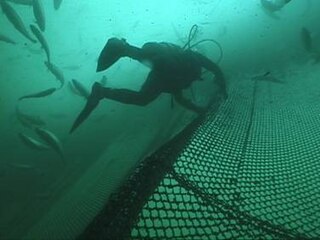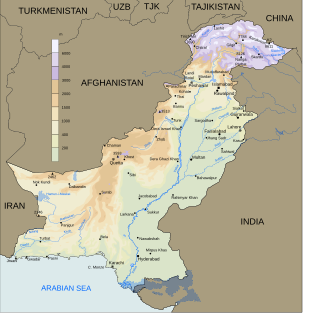
Aquaculture, also known as aquafarming, is the controlled cultivation ("farming") of aquatic organisms such as fish, crustaceans, mollusks, algae and other organisms of value such as aquatic plants. Aquaculture involves cultivating freshwater, brackish water and saltwater populations under controlled or semi-natural conditions, and can be contrasted with commercial fishing, which is the harvesting of wild fish. Mariculture, commonly known as marine farming, refers specifically to aquaculture practiced in seawater habitats and lagoons, as opposed to freshwater aquaculture. Pisciculture is a type of aquaculture that consists of fish farming to obtain fish products as food.

Mariculture or marine farming is a specialized branch of aquaculture involving the cultivation of marine organisms for food and other animal products, in enclosed sections of the open ocean, fish farms built on littoral waters, or in artificial tanks, ponds or raceways which are filled with seawater. An example of the latter is the farming of marine fish, including finfish and shellfish like prawns, or oysters and seaweed in saltwater ponds. Non-food products produced by mariculture include: fish meal, nutrient agar, jewellery, and cosmetics.

Fish farming or pisciculture involves commercial breeding of fish, most often for food, in fish tanks or artificial enclosures such as fish ponds. It is a particular type of aquaculture, which is the controlled cultivation and harvesting of aquatic animals such as fish, crustaceans, molluscs and so on, in natural or pseudo-natural environment. A facility that releases juvenile fish into the wild for recreational fishing or to supplement a species' natural numbers is generally referred to as a fish hatchery. Worldwide, the most important fish species produced in fish farming are carp, catfish, salmon and tilapia.

A conventional idea of a sustainable fishery is that it is one that is harvested at a sustainable rate, where the fish population does not decline over time because of fishing practices. Sustainability in fisheries combines theoretical disciplines, such as the population dynamics of fisheries, with practical strategies, such as avoiding overfishing through techniques such as individual fishing quotas, curtailing destructive and illegal fishing practices by lobbying for appropriate law and policy, setting up protected areas, restoring collapsed fisheries, incorporating all externalities involved in harvesting marine ecosystems into fishery economics, educating stakeholders and the wider public, and developing independent certification programs.

Charoen Pokphand Foods Public Company Limited, a company of the Charoen Pokphand Group, is an agro-industrial and food conglomerate headquartered in Thailand. It is the world's largest producer of feed and shrimp, and is also a global top three producer of poultry and pork.
Stolt-Nielsen Limited (SNL) provides transportation and storage for liquids, notably specialty and bulk liquid chemicals. It also has an aquaculture division that grows turbot and other fish and fish products.
Mowi ASA, formerly known as Marine Harvest ASA, , is a Norwegian seafood company with operations in a number of countries around the world. The company's primary interest is fish farming, primarily salmon, the operations of which are focused on Norway, Scotland, Canada, the Faroe Islands, Ireland and Chile. The group has a share of 25 to 30% of the global salmon and trout market, making it the world's largest company in the sector. Mowi also owns a 'value added processing' unit, which prepares and distributes a range of seafood products, and a number of smaller divisions.
Niels G. Stolt-Nielsen is a Norwegian business leader. Since 1996 he has served as director of Stolt-Nielsen Limited (SNL), a company with principal operations in parcel tankers, bulk-liquid storage, tank containers and aquaculture. Since 2000 he has been the company's chief executive officer, taking over after his father, Jacob Stolt-Nielsen.
SalMar ASA is a Norwegian fish farm company and one of the world's largest producers of farmed salmon. The company's main activities include marine-phase farming, broodfish and smolt production, processing and sale of farmed salmon. It holds 100 licenses for production of Atlantic salmon in Norway, located in Trøndelag, Nordmøre and, through its subsidiary Senja Sjøfarm AS, Troms. It also owns 50% of Norskott Havbruk which operates fish farms as Scottish Sea Farms. The company is based in Frøya and is listed on the Oslo Stock Exchange since 2007. The company was founded in 1991, its main shareholder is today the founder's son Gustav Magnar Witzøe.
Bjørn Myrseth is a Norwegian biologist and businessperson, and since 1987 chief executive officer of Marine Farms. Myrseth was educated in fishery biology from the University of Bergen, and was a co-founder of Stolt Sea Farms in 1972, where he was CEO until 1987. He then sold his stake in the company, and founded Marine Farms, where he continues as CEO.

Aquaculture started to take off in New Zealand in the 1980s. It is dominated by mussels, oysters and salmon. In 2007, aquaculture generated about NZ$360 million in sales on an area of 7,700 hectares. $240 million was earned in exports.

The aquaculture of salmonids is the farming and harvesting of salmonid fish under controlled conditions for both commercial and recreational purposes. Salmonids, along with carp and tilapia, are the three most important fish groups in aquaculture. The most commonly commercially farmed salmonid is the Atlantic salmon.

Seaweed farming or kelp farming is the practice of cultivating and harvesting seaweed. In its simplest form, farmers gather from natural beds. Alternatively, farmers fully control the crop's life cycle.

Copper alloys are important netting materials in aquaculture. Various other materials including nylon, polyester, polypropylene, polyethylene, plastic-coated welded wire, rubber, patented twine products, and galvanized steel are also used for netting in aquaculture fish enclosures around the world. All of these materials are selected for a variety of reasons, including design feasibility, material strength, cost, and corrosion resistance.

Fishery and fishing industry plays a significant part in the national economy of Pakistan. With a coastline of about 1,120 km, Pakistan has enough fishery resources that remain to be developed. Most of the population of the coastal areas of Sindh and Balochistan depends on fisheries for livelihood. It is also a major source of export earning.

Aquaculture is the farming of fish, shellfish or aquatic plants in either fresh or saltwater, or both. The farmed animals or plants are cared for under a controlled environment to ensure optimum growth, success and profit. When they have reached an appropriate size, they are harvested, processed, and shipped to markets to be sold. Aquaculture is practiced all over the world and is extremely popular in countries such as China, where population is high and fish is a staple part of their everyday diet.

Offshore aquaculture, also known as open water aquaculture or open ocean aquaculture, is an emerging approach to mariculture where fish farms are positioned in deeper and less sheltered waters some distance away from the coast, where the cultivated fish stocks are exposed to more naturalistic living conditions with stronger ocean currents and more diverse nutrient flow. Existing "offshore" developments fall mainly into the category of exposed areas rather than fully offshore. As maritime classification society DNV GL has stated, development and knowledge-building are needed in several fields for the available deeper water opportunities to be realized.
Aquaculture in Madagascar started to take off in the 1980s. The industry includes the cultivation of sea cucumbers, seaweed, fish and shrimp and is being used to stimulate the country's economy, increase the wages of fishermen and women, and improve the regions ocean water quality. Coastal regions of Madagascar are reliant on the Indian Ocean's marine resources as a source of food, income, and cultural identity.

Aquaculture in the United Kingdom is dominated by salmon farming, then by mussel production with trout being the third most important enterprise. Aquaculture in the United Kingdom represents a significant business for the UK, producing over 200,000 tonnes of fish whilst earning over £700 million in 2012 (€793 million).













